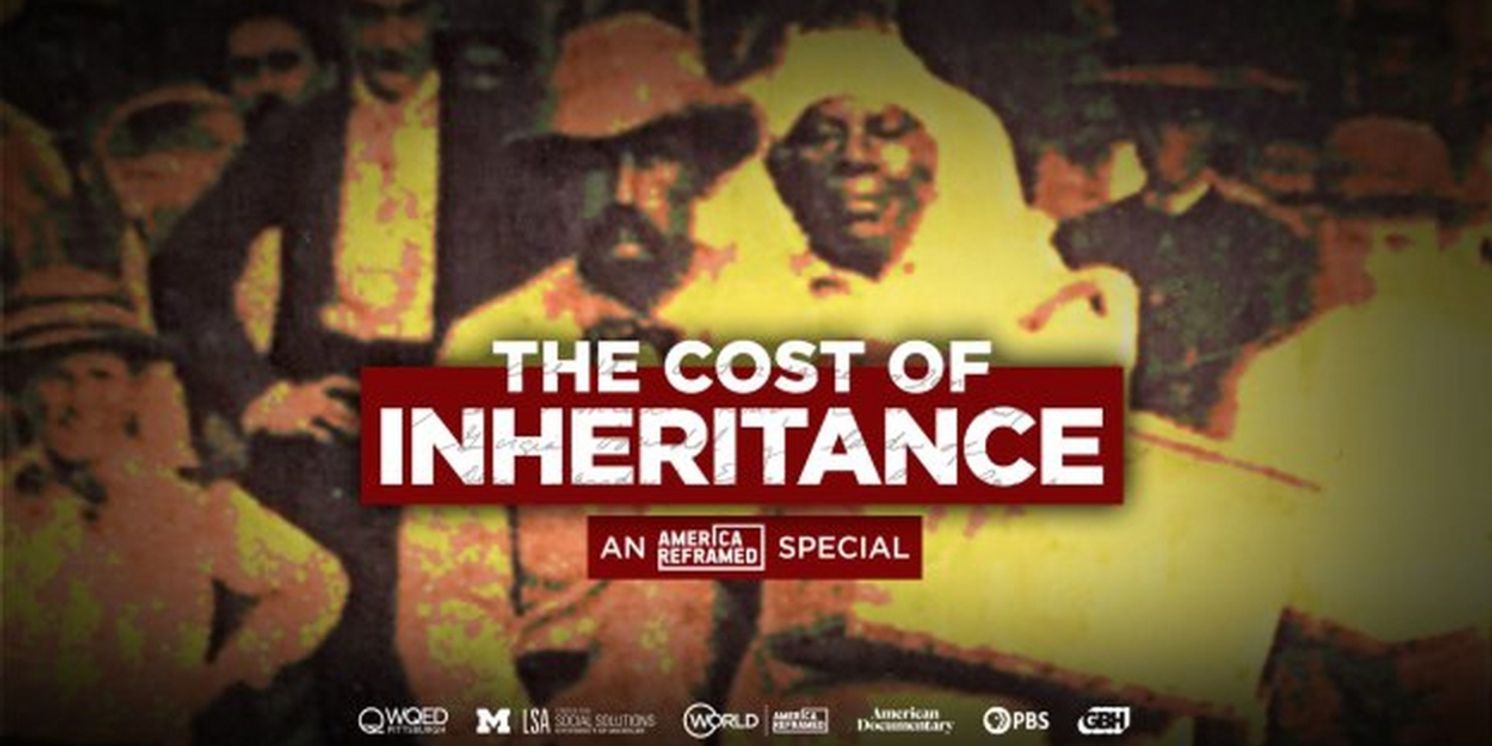THE COST OF INHERITANCE: AN AMERICA REFRAMED SPECIAL Coming to PBS In January
The Cost of Inheritance: An American ReFramed Special will have its national broadcast premiere on January 8, 2024, at 10:00 p.m. ET.

PBS, WQED, WORLD, and American Documentary announced that the new documentary The Cost of Inheritance: An American ReFramed Special will have its national broadcast premiere on January 8, 2024, at 10:00 p.m. ET (check local listings) on PBS, PBS.org, and the PBS App.
The film will launch on WORLD on Martin Luther KING Jr. Day, Monday, January 15, 2024, at 8:00 p.m. ET. The one-hour film traces the nation’s legacy of systemic inequities to modern-day America, introducing audiences to descendants of enslaved persons and slave owners, profiling their complex intertwined histories, and detailing how their quest to bridge divides galvanized them to seek reparations together.
The film’s world premiere will be at DOC NYC, America’s largest documentary festival, on November 12, 2023.
Directed by Emmy® nominee Yoruba Richen (The Rebellious Life of Mrs. Rosa Parks), The Cost of Inheritance: An AMERICA REFRAMED Special presents a nuanced view of the key issues, scope, and rationale of the reparations debate from a number of perspectives. The film documents communities seeking to make amends for economic inequalities stemming from historic racial injustice with the aim to launch conversations about specific actions that aspire to close the racial wealth gap in America.
Participants in the film address the cumulative impact of racial discrimination and a lack of opportunities firmly rooted in the system of enslavement. The film follows the long journey of individuals and communities seeking to make reparations a reality on the individual, local, and national levels.
“Making this film REVEALED to me how individuals and communities are grappling with the history of enslavement both on a personal and national level,” said Richen. “The stories in the film provide a necessary pathway for how we can engage in honest conversation about our past and move forward towards racial justice. Never has there been a more urgent time to engage in this discussion as the global reckoning with slavery and colonialism continues to unfold.”
The documentary examines how reparations are defined and for whom they are sought. Personal stories, expert interviews, and rich archival materials weave a narrative around the status of strategies for reparations, restitution, and restoration today.
“Combining personal stories, archival footage, scholarly analyses, and the viewpoints of a range of Americans, this film is a powerful reminder of our shared histories and intertwined legacies. It asks the viewer to examine the myriad ways we should think about repair and healing by noting what has been done, could be done, and should be done. It reminds us of our inheritances,” said Earl Lewis, Founding Director, University of Michigan Center for Social Solutions.
The history of the disparate trajectory of lives marginalized by slavery and its aftermath – in the form of Reconstruction and Jim Crow laws – unfolds through archival footage and insights from a diverse roster of interviews. The film includes robust historical context from experts, activists, and historians including Congresswoman Sheila Jackson Lee, (D-Texas); Dr. Ron Daniels, president of the National African American Reparations Commission; Dr. Mary Frances Berry, historian, author, activist; and noted economist Shawn Rochester, author, The Black Tax.
“If you go back to 1860, we know there's about four million Black people held in bondage,” remarked Rochester. “Those people are the most liquid asset in the country; 22 trillion in today's value, in terms of the value of those folks to the country. It's an enormous impact…You've got Black people TODAY in America that own about 2% of U.S. wealth. After all of this time, about 2%. How did we get here?”
Pittsburgh’s WQED provides interactive digital resources and discussion guides that will be released alongside the premiere of The Cost of Inheritance: An AMERICA REFRAMED Special, designed to encourage further conversations about the topics raised in the film.
The Cost of Inheritance: An AMERICA REFRAMED Special is a co-production of WQED, The University of Michigan Center for Social Solutions (CSS), and presented in partnership with WORLD and American Documentary. Promotion and station relations provided by WETA Washington, D.C. Community and station engagement provided by Red Owl.
Darryl Ford Williams is the executive producer for WQED. Chris Hastings (WORLD), Erika Dilday and Chris White (American Documentary) are executive producers for American ReFramed. Yoruba Richen is the director. Lacey Schwartz Delgado & Mehret Mandefro are the producers. Iris Samson is the associate producer. Keith Walker is the first director of photography, and Frank Caloeiro is the second. Jessica Lee Salas and Cecilia Préstamo are editors.
Funding for The Cost of Inheritance: An AMERICA REFRAMED Special was provided by the Ford Foundation, the Hewlett Foundation, the Rockefeller Brothers Fund and The John D. and Catherine T. MacArthur Foundation. Funding was also provided by public television viewers.
For additional details, please visit http://pbs.org/AmericaReFramed. Viewers are encouraged to join the conversation on social media via #CostOfInheritance.
Videos

